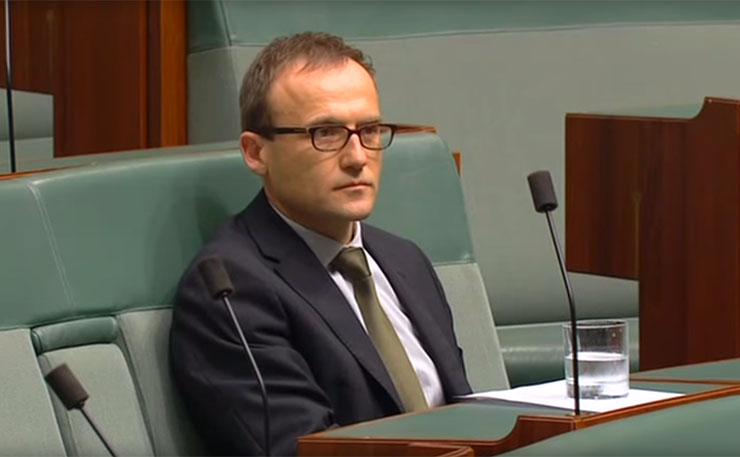Hot on the heels of anti-halal and wind farm inquiries, the Australian Parliament has decided to buck the trend and do something useful. Thom Mitchell reports.
The Federal Senate has finally rewarded a long-running push from the Australian Greens to establish an inquiry into making workplace entitlements like long service leave ‘portable’ between jobs, clearing a path for a large segment of the Australian workforce to reclaim an employment condition that has eroded over time.
Greens Employment and Workplace Relations spokesperson Adam Bandt has advocated a national portable long service leave scheme for years, and the former industrial relations lawyer said he said he hopes the Senate inquiry leads to lasting reform.
Long service leave is a quirk largely restricted to Australia and New Zealand. Introduced in the 1860s, it was designed to allow settlers time to sail back to Mother England, spend time with their family, and return – 13 weeks in total, five weeks to sail home, three weeks in England, and five weeks to sail back.
It used to be only available to government workers, but spread across the nation in the 1950s and 60s.
Today, long service leave is governed primarily by state and territory legislation (although there is a federal act as well) and it operates in various guises around the country. South Australia and Northern Territory, for example, have the most generous schemes, with workers entitled to 13 weeks full pay after 10 years service. Most other states offer eight weeks after 10 years service – the ACT offers six weeks after 7 years.
Bandt said it was time to revisit how long service leave operates nationally, and who can access it.
“The nature of work is changing and people are churning through contract and casual jobs more than ever before, but our workplace laws haven’t caught up,” Bandt said.
“As jobs become more precarious, we need to ensure people still have the right to take a break after years in the workforce.”
The Secretary of the Australian Council of Trade Unions, Dave Oliver also welcomed the inquiry.
“With the increasing number of casual and under-employed workers now making up a large part of our workforce, these people are vulnerable to exploitation in terms of their pay and conditions as well as being chronically insecure about whether they will even keep their jobs,” Oliver said.
The motion to establish an inquiry was co-sponsored by Greens Senator Janet Rice, Labor’s Sue Lines and Independent MP John Madigan, and it calls for an investigation into “the number of Australians in insecure work” and “the extent and nature of labour market mobility”.
More specifically, “the feasibility of, and options for, creating a national long service standard, and the portability of long service and other entitlements” will come under the Education and Employment References Committee’s microscope.
Ordinarily, if you leave an employer, you lose your long service, but workers in the coal mining, cleaning and building and construction industries already have access to portable long service leave.
Figures from the Melbourne Institute reveal that while, in 2012, almost 50 per cent of workers had been in the workforce for at least 10 years, just under 25 per cent of them had stayed with the one employer.
On that basis, which is likely to have worsened, roughly half of the people who would previously have enjoyed a hard-earned break after a decade on the job no longer do. According to Senator Rice, the average job tenure currently sits at three years, and as a result “long service leave has become a fantasy for many Australian workers”.

Rice’s home state of Victoria recently established its own, state-based, inquiry into making long service leave ‘portable’. As the Chair of that inquiry, Labor MP Nazih Elasmar notes that “even though workers are spending more of their lives in the workforce, they are moving jobs more often, which means they are less likely to rack up long service leave”.
There are a range of models around how a national portable long service leave scheme might work, some of which New Matilda explored back in March. Most would involve employers paying a levee into a centralised fund, with the employers’ contribution probably in the range of 2 to 2.5 per cent of wage costs.
The money would accrue over time, irrespective of whether a worker moved between jobs. It would be paid out once the employee had been working for 10 years, thereby preventing the cost from falling on a single business.
Nonetheless, as the Productivity Commission noted in its draft report on Australia’s workplace relations framework, “some employers may be reluctant to hire workers with accumulated entitlements as these would be more likely to request protracted leave close to their commencement date”.
In its submission to that inquiry, the Australian Council of Trade Unions identified portable long service leave as “the missing element in the comprehensive suite of minimum standards”. This afternoon Oliver told New Matilda that “the ACTU have advocated for a national portable long service standard and a national portable entitlements scheme for some time”.
“A national portability scheme would allow all workers — whether permanent, casual, temporary or contract — to accrue long service leave,” Oliver said.
“A portable long service leave scheme could also serve as a model for a national portable entitlements scheme for other kinds of leave, including sick and annual leave, which the union movement is pursuing.”
The Federal Labor party had voted against earlier Greens motions calling for a Senate inquiry, but today’s vote passed ‘on the voices’ with Labor’s support. The inquiry is due to report in February next year.
You can find out more about your existing long service leave entitlements (if you have them) here, at the Fair Work Commission.
Donate To New Matilda
New Matilda is a small, independent media outlet. We survive through reader contributions, and never losing a lawsuit. If you got something from this article, giving something back helps us to continue speaking truth to power. Every little bit counts.





